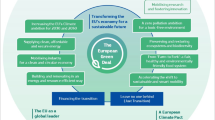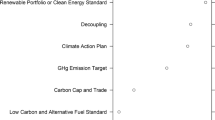Abstract
This paper analyses the formation and stability of coalitions to form international environmental agreements. We present and apply the Stability of coalitions model to assess the internal and external stability of all possible coalition structures in a cartel formation game; first under the assumption that no transfers take place and second for a transfer scheme. One important novelty of this paper is the analysis of the incentive structure of twelve regions for all possible combinations of (cartel) coalitions in an empirical setting with asymmetric regions. We show that stable coalitions can emerge only if benefits from global abatement are sufficiently high or if an appropriate transfer scheme is introduced.
Similar content being viewed by others
References
Babiker MH, Reilly JM,Mayer M, Eckaus RS,Wing IS, Hyman RC (2001) TheMIT emissions prediction and policy analysis (EPPA) model: revisions, sensitivities, and comparison of results. MIT, Cambridge Report 71
Barrett S (1994) Self-enforcing international environmental agreements. Oxf Econ Pap 46:878–894
Barrett S (1997) Heterogeneous international agreements. In: Carraro C (ed) International environmental negotiations: strategic policy issues. Edward Elgar, Cheltenham (UK)
Bauer A (1992) International cooperation over greenhouse gas abatement. Mimeo, Seminar für empirische Wirtschaftsforschung. University of Munich, Munich
Bloch F (1997) Non-cooperative models of coalition formation in games with spillovers. In: Carraro C, Siniscalco D (eds) New directions in the economic theory of the environment. Cambridge University Press, Cambridge
Bosello F, Buchner B, Carraro C (2003) Equity, development, and climate change control. J Eur Econ Assoc 1:601–611
BotteonM, Carraro C (1997) Burden-sharing and coalition stability in environmental negotiations with asymmetric countries. In: CarraroC(ed) International environmental negotiations: strategic policy issues. Edward Elgar, Cheltenham (UK)
Botteon M, Carraro C (1998) Strategies for environmental negotiations: issue linkage with heterogeneous countries. In: Hanley N, Folmer H (eds) Game theory and the global environment. Edward Elgar, Cheltenham (UK)
Buchner B, Carraro C, Cersosimo I, Marchiori C (2002) Back to Kyoto? US participation and the linkage between R&D and climate cooperation. CEPR Discussion Paper 3299
Carraro C, Siniscalco D (1993) Strategies for the international protection of the environment. J Pub Econ 52(3):309–328
Chander P, Tulkens H (1995)Acore-theoretic solution for the design of cooperative agreements on transfrontier pollution. Int Tax Pub Finance 2(2):279–293
Chander P, Tulkens H (1997) The core of an economy with multilateral environmental externalities. Int J Game Theory 26(3):379–401
Dellink RB, Finus M, van Ierland EC, Altamirano J-C (2003) Empirical background paper of the STACO model. University ofWageningen, Mimeo Available on the STACO website: http://www.sls.wau.nl/enr/staco
Ellerman AD, Decaux A (1998) Analysis of post-Kyoto CO2 emissions trading using marginal abatement curves. MIT Report 40. http://web.mit.edu/globalchange/www/rpt40.html
Eyckmans J, Finus M (2003) Coalition formation in a global warming game: How the design of protocols affects the success of environmental treaty-making. CLIMNEG Working Papers 56
Eyckmans J, Tulkens H (2003) Simulating coalitionally stable burden sharing agreements for the climate change problem. Resour Energy Econ 25(4):299–327
Fankhauser S (1995) Valuing Climate Change. Earthscan, London
Finus M (2001) Game theory and international environmental cooperation. Edward Elgar, Cheltenham (UK)
Finus M (2003a) Stability and design of international environmental agreements: the case of transboundary pollution. In: FolmerH, Tietenberg T (eds) International yearbook of environmental and resource economics 2003/4. Edward Elgar, Cheltenham (UK)
Finus M (2003b) New developments in coalition theory: an application to the case of global pollution. In: Marsiliani L, Rauscher M,Withagen C (eds) Environmental policy in an international perspective. Kluwer, Dordrecht (Holland)
Finus M, Rundshagen B (2003a) Endogenous coalition formation in global pollution control: a partition function approach. In: Carraro C (ed) Endogenous formation of economic coalitions. Edward Elgar, Cheltenham (UK)
Finus M, Rundshagen B (2003b) How the rules of coalition formation affect stability of international environmental agreements. Working Paper 62.2003. Fondazione Eni Enrico Mattei, Milano
Germain M, van Steenberghe V (2001) Constraining equitable allocations of tradable greenhouse gases emission quotas by acceptability. CORE-Discussion Paper 2001/5. Université Catholique de Louvain, Louvainla- Neuve
Germain M, Toint PL, Tulkens H, de Zeeuw A (2003) Transfers to sustain dynamic core-theoretic cooperation in international stock pollutant control. J Econ Dyn Control 28(1):79–99
Hoel M (1992) International environment conventions: the case of uniform reductions of emissions. Environ Resour Econ 2(2):141–159
Hoel M, Schneider K (1997) Incentives to participate in an international environmental agreement. Environ Resour Econ 9(2):153–170
Jeppesen T, Andersen P (1998) Commitment and fairness in environmental games. In: Hanley N, Folmer H (eds) Game theory and the environment. Edward Elgar, Cheltenham (UK)
KaitalaV, Mäler K-G, TulkensH(1995) The acid rain game as a resource allocation processwith an application to the international cooperation among Finland, Russia and Estonia. Scand J Econ 97(2):325–343
Nordhaus WD (1994) Managing the global commons. MIT Press, Cambridge
NASA (2002) GDP inflation calculator based on “Budget of the United States Government, Fiscal Year 2001”, historical tables, Table 10.1, gross domestic product and deflators used in the historical tables: 1940–2005 http://www.jsc.nasa.gov/bu2/inflateGDP.html
Rubio S, Ulph A (2001) A simple dynamic model of international environmental agreements with a stock pollutant. University of Southampton, Preliminary Version
Tol RSJ (1997) A decision-analytic treatise of the enhanced greenhouse effect. PhD Thesis. Vrije Universiteit, Amsterdam
Tol RSJ (2001) Climate coalitions in an integrated assessment model. Comput Econ 18(2):159–172
Weikard HP, Finus M, Altamirano-Cabrera J-C (2004) The impact of surplus sharing on the stability of international climate agreements. Nota di Lavoro 99.2004. Fondazione Eni Enrico Mattei, Milano
Weyant J (ed) (1999) The costs of the Kyoto protocol: a multi-model evaluation. Energy J special issue
Yi S-S (1997) Stable coalition structures with externalities. Games Econ Behav 20(2):201–237
Author information
Authors and Affiliations
Corresponding author
Additional information
The authors acknowledge the support of Juan-Carlos Altamirano-Cabrera, Eligius Hendrix, Niels Olieman, Pepijn van Oort, Arjan Ruijs and Hans-Peter Weikard in the analysis. Furthermore, the comments by two anonymous referees are gratefully acknowledged. The usual disclaimer applies.
Rights and permissions
About this article
Cite this article
Finus, M., Ierland, E.v. & Dellink, R. Stability of Climate Coalitions in a Cartel Formation Game. Economics of Governance 7, 271–291 (2006). https://doi.org/10.1007/s10101-005-0009-1
Received:
Accepted:
Published:
Issue Date:
DOI: https://doi.org/10.1007/s10101-005-0009-1
Keywords
- International environmental agreements
- Kyoto-Protocol
- Cartel formation
- Stability of coalitions
- Non-cooperative game theory




